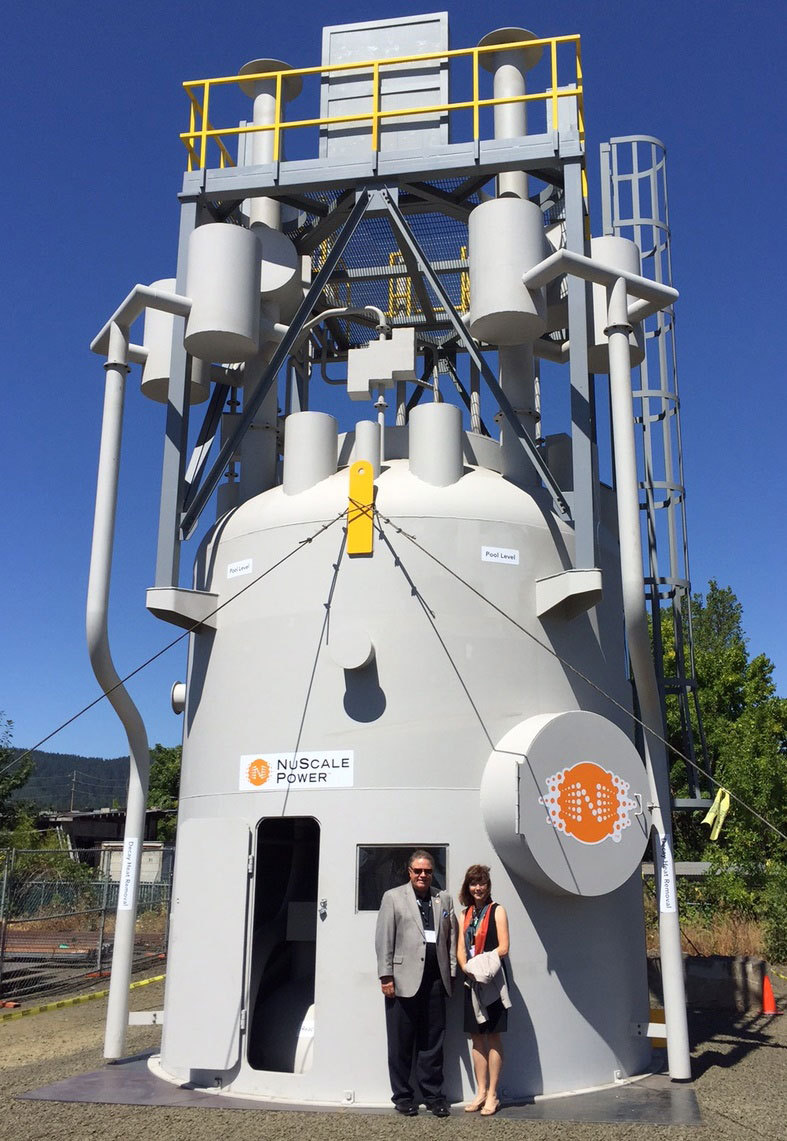 |
| NuScale Power Exposition |
Yet privately-held
NuScale leaves investors with few options to get a stake in what promises to be
a seminal moment in the nuclear power industry.
As alternatives to a direct investment in NuScale, investors can
consider the company’s partners.
BWX Technologies, Inc. (BWXT: NYSE) has been tapped by NuScale to produce the core reactor of the SMR. BWXT is a supplier of nuclear components and
fuel to the U.S. government and proprietary fuel for the CANDU class of
commercial power reactors. Additional
manufacturers may be responsible for other systems, such as chemical control or
electrical. While BWXT and other systems manufacturers are ‘mission critical’
partnerships for NuScale, they are not the
only ones of importance.
NuScale has had
a long standing partnership with Fluor
Corporation (FLR: NYSE),
a well-established engineering, procurement and construction company. Fluor had been a source of technical support
as NuScale was completing the design of its module reactor. The company has also given Fluor exclusive
rights to engineering and construction contracts when the SMR is finally certified
for commercial. NuScale might be the
winner in the pact. Fluor has been
designing and constructing commercial nuclear facilities since 1970, when Fluor
began work on Alabama Power’s Farley Nuclear Plant. Even before Fluor had done extensive
engineering and construction work for the U.S. government nuclear program.
Fluor was an
early believer in NuScale’s plan to bring a small modular reactor to the
nuclear power industry. In 2012, Fluor
invested committed to a $30 million investment in NuScale and now holds a
majority equity interest in NuScale. Consequently,
NuScale’s financial performance is reported by Fluor in its Industrial, Infrastructure
& Power segment. NuScale costs and
expenses net of reimbursements totaled $76 million in 2017, compared to $92
million and $80 million in 2016 and 2015, respectively.
NuScale has not
been entirely dependent upon Fluor’s largesse.
In 2014, the company received a $217 million multi-year funding award
from the U.S. Department of Energy. The
DOE has a technical support program aimed at promoting small modular reactors
through the reimbursement of first-of-a-kind engineering costs. NuScale reported $48 million in reimbursable
expenses in 2017, compared to $57 million and $48 million in 2016 and 2015,
respectively. The company expects to
qualify for the entire DOE award before the end of 2018.
A stake in Fluor
could be a back door to NuScale. Fluor
shares are trading at 13.9 times projected earnings for 2019. That compares favorably against the current
25.1 multiple of Fluor’s trailing earnings.
Analysts following Fluor clearly see strength in the company’s future
sales and earnings. In the twelve months
ending June 2018, Fluor reported $19.7 billion in total sales, providing $252.0
million in net income or $1.79 in earnings per share. In that same period, Fluor generated $41.5
million in operating cash flow.
Cash flows have
been sufficient to cover capital expenditures and a dividend payout ratio near
47%. Strong cash flows have also helped
build up the cash kitty to $1.8 billion, which just tops debt of $1.7 billion.
Financial
metrics all point to a strong company
- profitable and secure. However, Flour is still an engineering,
procurement and construction business model, that is subject to quarterly
variance as it works through projects large and small. The business model is subject to project
delays and changes that can unexpectedly impact reported sales and
earnings. Such developments can whipsaw
the stock price. The beta risk measure
is 1.68, revealing a somewhat volatile stock price.
Investors
looking for smoother sailing could consider shares of BWX Technologies instead. Its beta measure is a modest 0.59. There is compensation to be paid for the
lower price risk. BWTX share trade at
21.1 times estimated earnings, which is favorable in comparison to a 38.1
multiple times trailing earnings.
BWXT reported
$1.8 billion in total revenue in the twelve months ending June 2018, providing
$158 million in net income or $1.57 in earnings per share. BWXT is also quite successful in converting
sales to cash. In the same twelve month
period operating cash flow was $175.4 million.
The BWXT balance
sheet is not as flush as that of Fluor.
The debt-to-equity ratio is 175.3, revealing a heavy reliance on debt. The cash balance at the end of June 2018, was
$319.5 million and covered less than half outstanding debt. BWXT’s management team might be more
confident turning up leverage because the business model of selling nuclear
reactor components and fuel modules affords more predictable revenue and
earnings streams.
Both BWX
Technology and Fluor will benefit from NuScale’s success in
commercializing. Each stock has its
positives and negatives. Perhaps the
better alternative is to take positions in both companies.
Neither the author of the Small Cap Strategist web
log, Crystal Equity Research nor its affiliates have a beneficial interest in
the companies mentioned herein.
No comments:
Post a Comment